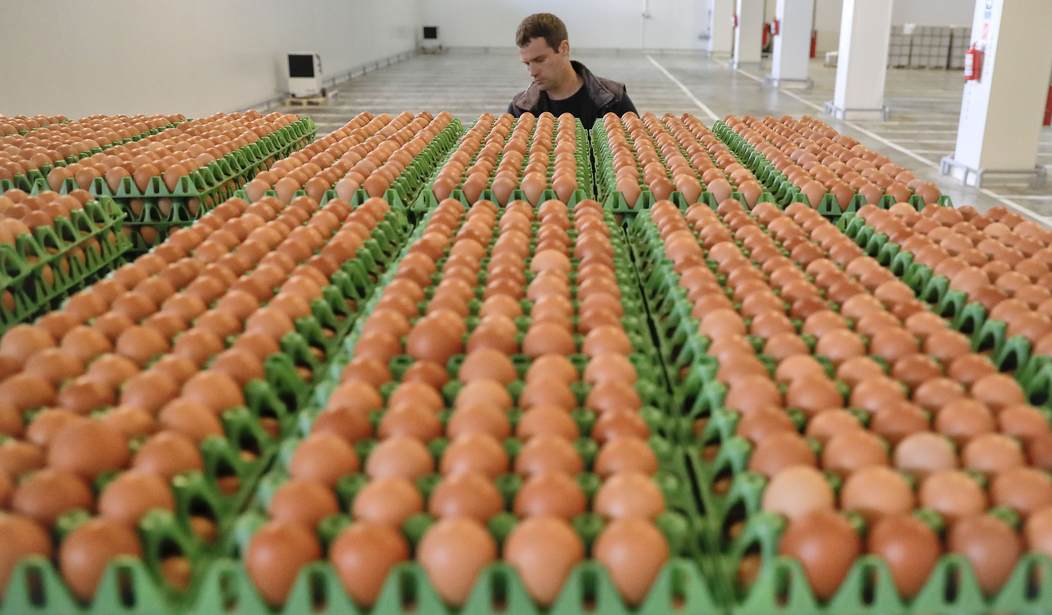Egg smuggling is a thing now. Thanks to Bidenflation and the avian flu, there is a shortage of eggs in some places and a sharp increase in egg prices in most places in the United States. People are crossing the border to purchase eggs and attempting to bring them back across the border. It’s a no-no.
A carton of a dozen eggs in the U.S. cost on average $4.25 in December, a 137% increase over the year prior. And the price of eggs increased by 11.1% in December compared to the month before. When prices rise like that, shoppers tend to look for alternatives. So it’s no surprise that the number of eggs intercepted at the U.S.-Mexico border has soared in recent months.
“We are seeing an increase in people attempting to cross eggs from Juarez to El Paso because they are significantly less expensive in Mexico than the U.S.,” Roger Maier, a public affairs official with the Customs and Border Protection office, told Fortune, adding that other points of entry in the Southwest are seeing similar increases in undeclared poultry-related crossings.
Some economic experts point to some good economic news in recent weeks like a decline in shipping costs, prices falling on some food products, and stores offering discounts and deals during the holiday season. However, the price of eggs has remained high and shoppers in many parts of the country can’t even find them on grocery store shelves. So, residents in border communities are crossing over the border to buy eggs.
There were 2,002 border seizures involving eggs between Nov. 1 and Jan. 17, according to CBP data, a 336% increase over the same period a year prior.
For health reasons, the CBP prohibits undeclared arrivals of poultry products including eggs and released a statement Friday urging travelers not to carry raw eggs and poultry products across the border. Smugglers who fail to declare the prohibited eggs and poultry items are liable to a $10,000 fine, Jennifer De La O, Director of Field Operations for the CBP in San Diego, wrote in a tweet last week.
Such a large fine usually means the prohibited items are being brought into the U.S. to be resold, according to CBP regulations. The CBP levies a $1,000 fine if undeclared prohibited items enter the U.S. for non-commercial use, but if officials can confirm otherwise, fines can be imposed at a “much higher rate.”
Maier said most of the intercepted eggs have been confiscated during primary inspections, during which people can abandon the items without penalty. These instances are “not necessarily smuggling,” he said, but he added that in the past week, there have been a “very small number of cases” where eggs went undeclared but were then discovered, leaving perpetrators liable to a large fine.
CBP restricts undeclared arrival of eggs and other poultry products to the U.S. It is to protect against diseases, specifically avian flu, or bird flu. Avian flu has swept the U.S. for the past year and is primarily responsible for the egg shortage and high prices.
There is a significant difference in the price of eggs in Mexico. A kilogram (slightly more than a dozen large eggs) cost between $1.70 and $2.20 last week in Guadalajara, Mexico’s second-largest city. In the U.S., a dozen large eggs cost on average a little more than $4.00 last month. Shoppers in San Ysidro, a district of San Diego that borders Mexico, are going to Mexico to purchase eggs.
Avian flu has led to the culling of 44 million egg-laying hens in the United States. Last week the Department of Agriculture said the domestic egg supply has been falling by 7.5% each month since February. On Friday the USDA said the price pressures are easing a little from a December high but the ongoing supply constraints still keep the price of eggs higher than normal.
CBP is trying to get the word out to shoppers. If you buy groceries in Mexico, you have to eat the eggs there — don’t try to cross with raw eggs on your return. Raw egg seizures at El Paso-area ports of entry have nearly doubled from a year ago. They have risen more than 300% each at Laredo, Tucson, and San Diego ports. In El Paso, it’s a small number so far. There were 42 seizures from November to January, which was up from 22 a year ago. San Diego customs officers made more than 1,000 seizures over the same period. That was up from 230 a year ago.
Earlier this week I wrote about a farm group that is asking for a Congressional investigation into potential price gouging as a reason for increased egg prices. On Tuesday, Senator Jack Reed D-R.I.) called on the Federal Trade Commission (FTC) to investigate egg prices. In a letter to the FTC he asked if outbreaks of avian flu are a cover for price gouging.
“At a time when food prices are high and many Americans are struggling to afford their groceries, we must examine the industry’s role in perpetuating high prices and hold those responsible accountable for their actions,” Reed wrote.
He also noted that “small producers, which have faced many of the same market challenges as the biggest producers, have managed to keep prices under control.”
With the Easter season approaching, we can probably expect more plastic eggs than real ones used for egg hunts this year.







Join the conversation as a VIP Member